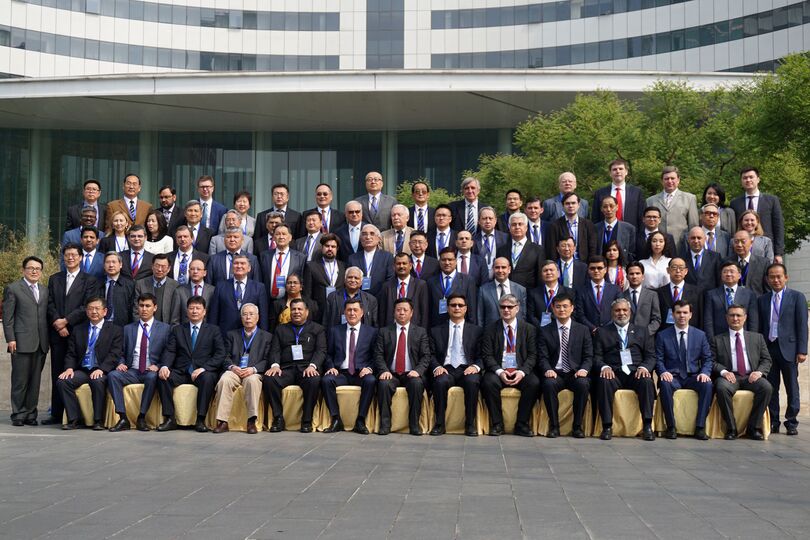On 17-18 April 2019, Beijing hosted the 14th meeting of the SCO Forum, organised by the China Institute of International Studies of the Ministry of Foreign Affairs of China. It brought together over 100 academics, experts and diplomats from India, Kazakhstan, China, Pakistan, Russia, Tajikistan, Uzbekistan, Afghanistan, Belarus, Iran, Mongolia, Azerbaijan, Armenia and Cambodia.
Vice Minister of Foreign Affairs of China Zhang Hanhui, SCO Secretary-General Vladimir Norov, and Director of the China Center for SCO Studies Qi Zhenhong welcomed the participants of the Forum.
The Secretary-General spoke in detail about the work being done to strengthen political dialogue, maintain stability in the region, develop practical trade and economic cooperation, and deepen people-to-people ties within the SCO. In addition, he shared information on new initiatives aimed at fulfilling the SCO's economic potential.
Speaking about the role of the SCO Forum, he stressed that the Organisation is developing against a complex global and regional background. As such, the SCO's practical activities need more objective support in the form of research and analysis, and in this regard the SCO Forum has a special role to play. The need to increase the practical impact of the Forum's activities is also noted in the SCO Development Strategy until 2025. In this regard, he said it is important to implement in practice the Forum Regulations on conducting joint research and preparing analytical and forecast materials, participating in the expert review of projects as part of SCO multilateral cooperation programmes, and organising international research conferences, round tables and other events on issues of interest to the SCO.
During the two days of the Forum, academics and experts discussed a wide range of issues relating to the current and future trajectory of the SCO region, as well as the role of the Organisation in the fight against terrorism, extremism, separatism, drug trafficking and transnational crime. Much attention was paid to improving the efficiency of trade, economic and cultural cooperation. The participants spoke in favour of further building on the activities of the SCO Forum.
Following the Forum, the Protocol of the 14th meeting of the SCO Forum was signed, in which it was noted that the chairmanship of the Forum in 2019-2020 passes over to the National Institute for Strategic Studies of the Kyrgyz Republic.
The final document emphasises that despite the difficult international situation and existing challenges, the SCO has considerable potential for development. In this regard, it has been proposed that the key SCO bodies strengthen cooperation in the following areas:
— adhering to the principles of the "Shanghai spirit" in practice;
— deepening cooperation on security;
— intensifying cooperation in the fight against drug trafficking;
— strengthening multilateral economic and trade cooperation, promoting further trade and investment liberalisation in order to gradually create institutional mechanisms for regional economic cooperation;
— improving interconnectivity, strengthening the coupling of policies, technologies and standards, increasing the potential for common development;
— deepening cooperation in the implementation of hydropower projects for the benefit of the entire region;
— strengthening innovation-based cooperation, promoting the development of regional network information technologies;
— promoting people-to-people exchanges, expanding cooperation in culture, education, tourism, and the media.
— adhering to the principles of the "Shanghai spirit" in practice;
— deepening cooperation on security;
— intensifying cooperation in the fight against drug trafficking;
— strengthening multilateral economic and trade cooperation, promoting further trade and investment liberalisation in order to gradually create institutional mechanisms for regional economic cooperation;
— improving interconnectivity, strengthening the coupling of policies, technologies and standards, increasing the potential for common development;
— deepening cooperation in the implementation of hydropower projects for the benefit of the entire region;
— strengthening innovation-based cooperation, promoting the development of regional network information technologies;
— promoting people-to-people exchanges, expanding cooperation in culture, education, tourism, and the media.
The Forum participants expressed serious concern about the current difficult situation in Afghanistan and stressed that peace and stability are decisive factors in ensuring security and sustainable economic development in the region. They expressed support for the work of the SCO-Afghanistan contact group.
Experts spoke in favour of a significant intensification of economic cooperation within the SCO and expressed their support for multilateral integration projects in the SCO space.
The participants noted the need to intensify research on specific issues related to SCO development, as well as to strengthen ties between the research centres of the SCO member states and other authoritative analytical institutions, and called for the establishment of a mechanism for such cooperation.
